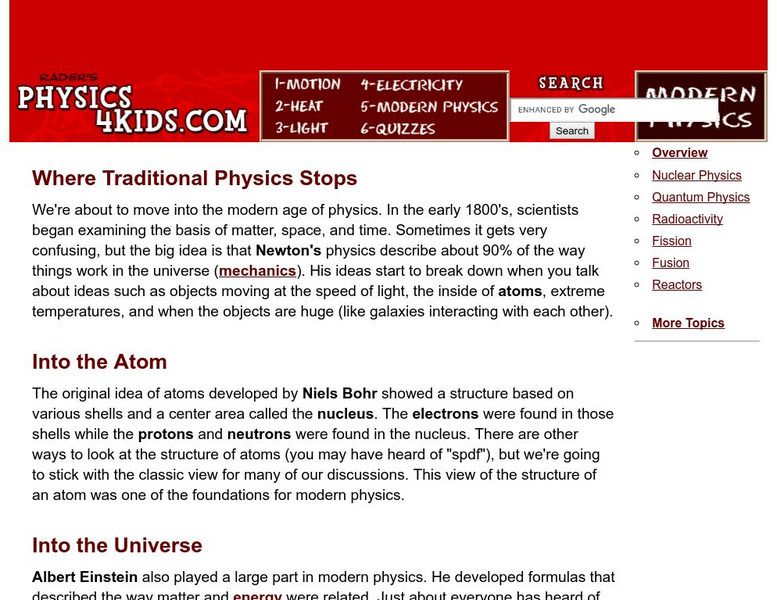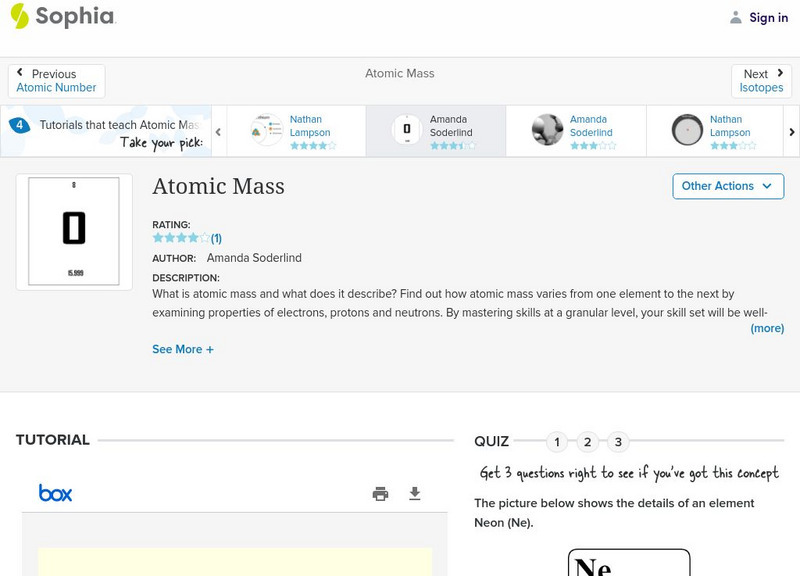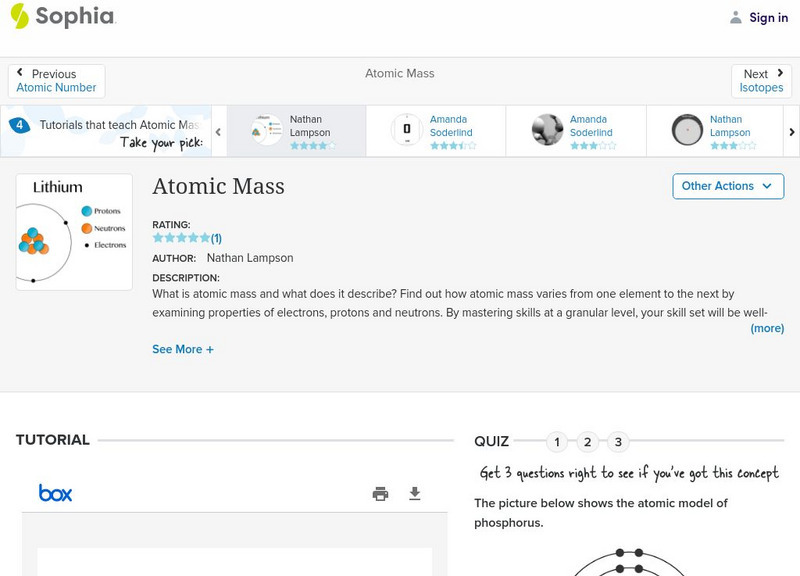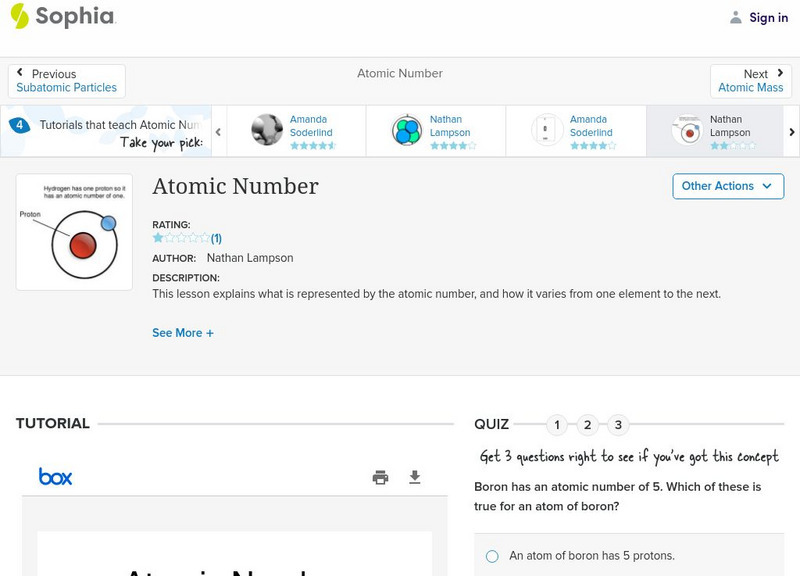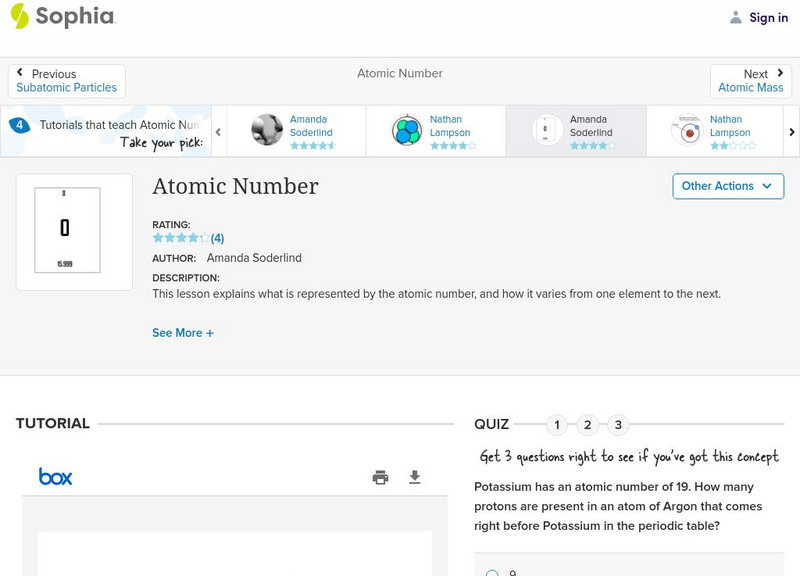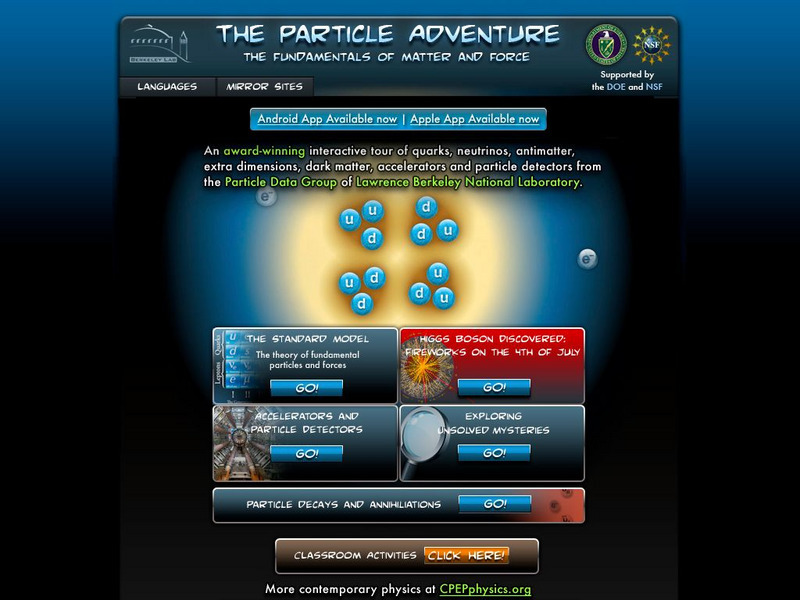Sophia Learning
Sophia: Subatomic Particles: Lesson 5
Describe the difference between the subatomic particles, including their masses, locations, and charges. This lesson is 5 of 7 in the series titled "Subatomic Particles."
ClassFlow
Class Flow: Atomic Structure: Parts of the Atom
[Free Registration/Login Required] This flipchart defines the parts of the atom. It uses Activotes for assessment.
Science4Fun
Science4 Fun: What Is Atom
Fun and interesting illustrated information on atoms including composition, elements, and history.
Quia
Quia: Mr. Snyder's Game of Atomic Terms
A short matching quiz on basic terminology related to atomic structure. Answers provided.
University of Colorado
University of Colorado: Ph Et Interactive Simulations: University of Colorado: Build and Atom
Build an atom out of protons, neutrons, and electrons, and see how the element, charge, and mass change. Then play a game to test how the ideas work!
University of Colorado
University of Colorado: Ph Et Interactive Simulations: Build an Atom
Build an atom out of protons, neutrons, and electrons, and see how the element, charge, and mass change. Then play a game to test your ideas!
Utah Education Network
Uen: Atomic Model Construction
Students create models of atoms then compare the various aspects of the atoms including; relative size, charge, positions of subatomic particles, and identity of the atom based on proton, neutron, and electrons with the class.
Curated OER
[Bohr Model of Unununium]
A look at the transition metal unununium, which was renamed roentgenium in 2004. Includes basic information, including symbol, number, mass, melting and boiling points, and numbers of protons, electron, and neutrons.
Thomas Jefferson National Accelerator Facility
Jefferson Lab: All About Atoms
The three basic particles that make up atoms are defined and illustrated.
Physics4kids
Physics 4 Kids: Where Traditional Physics Stops
We're about to move into the modern age of physics. In the early 1800's, scientists began examining the basis of matter, space, and time. Sometimes it gets very confusing, but the big idea is that Newton's physics describe about 90% of...
Sophia Learning
Sophia: Atomic Mass: Lesson 3
This lesson explains what is represented by the atomic mass, and how it varies from one element to the next. It is 3 of 4 in the series titled "Atomic Mass."
Sophia Learning
Sophia: Atomic Mass: Lesson 4
This lesson explains what is represented by the atomic mass, and how it varies from one element to the next. Module includes a slideshow and a quiz.
Sophia Learning
Sophia: Atomic Mass: Lesson 1
This lesson explains what is represented by the atomic mass, and how it varies from one element to the next. It is 1 of 4 in the series titled "Atomic Mass."
Sophia Learning
Sophia: Atomic Number: Lesson 3
This lesson explains what is represented by the atomic number, and how it varies from one element to the next. It is 3 of 7 in the series titled "Atomic Number."
Sophia Learning
Sophia: Atomic Number: Lesson 6
This lesson explains what is represented by the atomic number, and how it varies from one element to the next. It is 6 of 7 in the series titled "Atomic Number."
Sophia Learning
Sophia: Atomic Mass: Lesson 2
This lesson explains what is represented by the atomic mass, and how it varies from one element to the next. It is 2 of 4 in the series titled "Atomic Mass."
Sophia Learning
Sophia: Atomic Number: Lesson 5
This lesson explains what is represented by the atomic number, and how it varies from one element to the next. It is 5 of 7 in the series titled "Atomic Number."
ClassFlow
Class Flow: Intro to Atoms
[Free Registration/Login Required] This flipchart was converted from Power Point and is used to introduce the history and concept of the Atom.
Lawrence Berkeley National Laboratory
Berkeley Lab: The Particle Adventure
Visit this site for an interactive tour of the atom and all aspects of particle physics. View the animations available with almost every description on this site. A great place for the fundamentals of particles and forces including a...
American Chemical Society
Middle School Chemistry: Periodic Table
Students explore the periodic table and learn the basic information given for elements: the name, symbol, atomic number, and atomic mass for each element.
Annenberg Foundation
Annenberg Learner: Interactives: The Periodic Table
An interactive website where students learn about the basics of an atom, periodic tables organization, and the structure and properties of matter. Module includes an introduction and five lessons that are followed by a quiz and an...
Concord Consortium
Concord Consortium: How Does an Object Become Charged?
Activity 1 in this module: What is the effect of changing the composition of an atom? Since all atoms contain protons, neutrons, and electrons, what makes one element different from another is examined.
American Chemical Society
American Chemical Society: Hompage
ChemCenter, available from the American Chemical Society, provides chemistry news, reference sources and other public services.
Environmental Chemistry
Environmental chemistry.com: Anatomy of an Atom
Explains the basics of atomic structure, from simple definitions to information about quantum theory. Accurate and helpful basics whether or not you need the more advanced information.
Other popular searches
- Protons Neutrons Electrons
- Protons, Neutrons, Electrons
- Electrons, Neutrons, Protons
- Electrons, Protons, Neutrons
- Protons Neutrons, Electrons
- Protons Neutrons and Electrons
- Protons , Neutrons, Electrons









